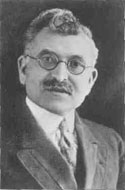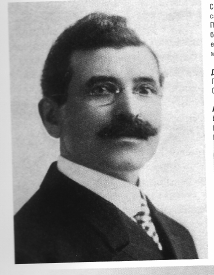Rev. Tzvetko Bagranoff(1871 - 1953) ,
Missionary to the Bulgarian Immigrants in tri-City Area.
1907-1952

Rev. Tzvetko Bagranoff(1871 - 1953) , |  |
It was first Dr. Elias Riggs, who in 1840’s as a member of American Board of Commissioners for Foreign Missions started his Evangelical work among the Bulgarians. This proved a long lasting relationship between two cultures. Students at the Protestant schools and colleges in European Turkey were to supply the Bulgarian intelligence necessary for the governing of young Bulgaria after 1878. Evangelical efforts have deep roots in the history of new-Bulgaria. Understanding this fact is essential to building a tolerant society in post-communist Europe. After 45 years of state controlled over basic religious freedoms, Bulgarian protestant community is blossoming. New church communities are starting across Bulgaria. Traditional Protestant denomination have joined effort in their Evangelical work: The Bulgarian Evangelical Alliance was reorganized in 1993 after 44 years of suppression (originally founded in 1909). Since communism was relaxed across Europe in 1989, Bulgarians have seen the opportunity of immigration abroad. United States and Canada have attracted large Bulgarian communities. This parallel the immigration of Bulgarian protestants to the same countries. In the early 1990’s Evangelical work started among these communities. This effort was made by Bulgarian ministers with previous training from Bulgaria, supported by native churches. In 2002 several protestant communities joined to establish the Bulgarian Evangelical Alliance. In 150 years Bulgarian Protestant History has made a complete circle. Foreign missionaries came planed a seed, raised it, it grew and gave fruit. Now the churches in Bulgaria are sending missionaries back to America.
For over 45 years communism settled as a protective cloud over Bulgaria, it’s ethos, culture and history. For most of us searching to connect our modern history with the period of 1878-1945, this is exciting time. Any drop of history revives our past. This holds truth for the evangelical community as well. Religious suppression during the communism period robed our community of inteligenca and set our growth back. All religious and foreign schools(other then Russian) were closed, the children of religious leaders were denied higher education. By 1989 the spirit of communist revisionist-history was running through everybody’s veins. Bulgarian history was intellectually isolated, up-rooted from any western ideological involvement. Direct consequences of this period is that Evangelical community has lost it’s credibility, simply because it was denied the right of history. After 1989 a Bulgarian citizen took pride in being: ethnically Bulgarian, Eastern-Orthodox, democracy loving nationalist.
During the last 13 years (this article was written in 2002) Evangelical history is slowly removing the heavy stone of historical anonymity. A number of books are revealing the wealth of information available on the subject. Western historians have done their equal share to reveal the facts behind the effort of the American missionaries in Bulgaria.
It was time when to be Protestant in Bulgaria meant to be a member of an distinct intellectual vanguard. Time when the American Schools in Bulgaria were education the new leaders of the young country. Back then the missionaries introduced our grand-parents to western style civilization. In this environment on March 25, 1871 in the village of Panagurishte was born Tzvetko Bagranoff. He was a soon of Stoyan H. Bagranoff one of the first Evangelists , and active participant in the April uprising 1876. We know that his family was “deeply religious, being exposed to the sermons of V. Petranov, Ivan Sechanov and Tz. Kumanov., he decided to study in the Theological School in Samokov . After graduating he continued his education in the Presbyterian Seminary in Auburn , New York. He was ordained as minister in America, after which he returned to Bulgaria and started his ministry in the city of Yambol(he was the pastor from 1897 t o 1900). Bagranoff also was a teacher the Samokov school for a year. His evangelical work is also fruitful in the village of Ihtiman, where he served for a short period. In 1901 through 1905, Bagranoff became the second regular pastor in the city of Pirdop. Here he preached to the local community, which assembled in his house. His work was helped by his sister Nedka Bagranoff-Ivanova. Their effort was fruitful “the interest for the evangelical truth were great, and the community grew fast”. In 1905 Tzvetko Bagranoff meet and married his wife Nevenka (graduate of Constantinople Women College also run by the American missionaries). The same year they left for America. On New Years day 1906 Bagranoff was appointed as a pastor of two churches in Bald Mount and Newton, Pennsylvania.
In 1907 Tzvetko Bagranoff received a call from the Illinois Synod of the Presbyterian Church to start a ministry among the Bulgarian and Macedonian immigrants in the area of Granite City, Illinois. Bulgarians settled in the area requiring cheep unskilled labor in the 1890’s. They were primarily employed in the casting plants of the American Steel Foundries and Commonwealth Steel Company. Living close to the poverty line, uneducated and un-churched, they presented the perfect missionary filed. In 1907 the after the stock marked crash and the furnaces and foundries in the area slowly closed. In this environment Bagranoff received a call to take a month leave of absence and examine the possibility of ministering to the Bulgarian community. He conducted his survey in October, and meet in November with the Home Missionary Committee, before which he agreed to start his pioneering work. After obtaining release from his congregations he moved his family to Granite City.
Work among Bulgarians immigrants was not easy, majority were determine to stay eastern-orthodox , for them religion and national pride were inner connected. As the economic stagnation of 1907 left almost twenty-five hundred Bulgarian workers idle, Bagranoff worked with Madison County officials to alleviate the suffering. His initial work were to establish social help for the community, and distribute food products. After 1908 American economy rebound, and Bagranoff redirected his effort. For two years he rented the back room of a saloon, where he preached regularly on Sundays. His work also included Sunday school and English language classes for the Bulgarians. Bagranoff actively evangelized the area, he meet with people in their homes, and businesses . He also published a monthly paper, both English and Bulgarian edition. Bagranoff also actively lectured against godless socialism, gambling and prostitution, and wrote pamphlets on Bulgarian and American politics. Also active in the ministry was his wife Nevenka, who taught Sunday school starting from 4 pupils in 1908. By 1909 she had 70 Sunday students and additional classes were held for over 200 students.
In 1912 after securing funds from the Illinois Synod of the Presbyterian Church, Bagranoff build and open the new Bulgarian mission in Madison. It was two-story building, thirty by seventy foot. The Bulgarian community had over 300 members of the mission during this period. That was less than half the members of the Bulgarian Orthodox church which had established already two churches in the tri-city area. The greatest achievement for Bagranoff was: “One thing stood out clearly the barriers of superstition have been broken down; hostility has been replaced by friendship… undesirable aliens have become respectable citizens”. By 1912 Bagranoff was recognized by both Protestant and Orthodox as the leader for the Bulgarian community. The same period interest shifted as The Balkan Wars broke out in South-East Europe. Tzvetko faithful to his heroic heritage( his father Hadji Stoyan Bagranoff was active in the Bulgarian liberation movement 1876-78) dedicated himself to Bulgarian nationalist causes. On October 6, 1912 in Granite City Bagranoff open a public rally with his patriotic speech, urging volunteers to return to Bulgaria and fight for the cause. By the end of October 500 volunteers were ready to leave sponsored by money raised from the local community. On the 30th of the same month they left for their destination. In the following months Tzvetko Bagranoff raised money for the Bulgarian Red Cross, for which effort he received personal cable from Queen Eleonora expressing her gratitude.
Disappointment which followed from Bulgarian defeat in The Second Balkan War did not slow down Tzvetko enthusiasm He worked hard to promote homeland cause as Bulgaria entered WW1 on the side of the Central Power Alliance 1915. This time Bagranoff effort was supported financially by Bulgarian Government. As before Tzvetko raised money for the Bulgarian red Cross by holding benefit events. In April 1917 USA entered WW1 on the side of the Britain and France. Although America did not declare war on Turkey and Bulgaria for a period, Bagranoff’s work suddenly was viewed as treasons. Under pressure from the local community Bagranoff soon was denied of any financial support from the Presbyterian Synod. This marked a dark period for the Bulgarian community, many drafted in the American army to prove their loyalty to their new homeland. In 1918 Nevenka and Tzvetko Bagranoff closed their mission and moved to St. Louis. Although soon excused by the American government Bagranoffs struggled to support family of four.
In the fall of 1919 Chicago Track Society agreed to support Tzvetko in opening a new mission. In September he began his Missouri ministry, by opening “The Near East Mission of St. Louis” associated with the Victor Street Mission. Bagranoff new effort was directed at all city immigrants. In 1922 he also received the financial support of the Women’s Missionary Federation. In 1928 Tzvetko received permission to preach Sunday services at Christ Church Cathedral located in St. Louis downtown. This magnificent building had great appeal to the orthodox community. Tzvetko Bagranoff work tirelessly until the end of his life. He passed away February 22, 1953 at the age of 82.

Send your comments to gdimitro@tigr.org